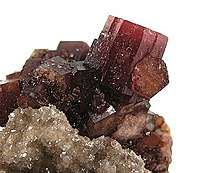Brokenhillite
Brokenhillite (German: Brokenhillit Spanish: Brokenhillita) is an earth mineral that exists in small quantities. It is only found in the far-western regions of New South Wales in Broken Hill, Australia. Although it has been given a name and chemical formula, it has not been approved by the International Mineralogy Association primarily because it is a manganese silicate of the pyrosmalite group which means the compositional similarities are too great to be an approved mineral. Brokenhillite structure is either composed of iron or manganese with the formula (Mn+2, Fe+2)8Si6O15(OH,Cl)10, and has either a hydroxide or a chloride rotation. The actual components inside Brokenhillite can be determined using a diffractometer. The structural basis of this mineral is determined to be phyllosilicate within the pyrosmalites due to the octahedral structure, with one perfect cleavage, a hardness of about 4.5, and a streak of light brown. The area of Broken Hill has a very diverse spreading of deposits with a sporadic layering of minerals. Due to the large region of deposition, few mineralogists have attempted to study its environment which is why there is a greater opportunity for further study despite the small amount of publications presented over the years.
| Brokenhillite | |
|---|---|
 Brokenhillite | |
| General | |
| Category | Mineralogy |
| Formula (repeating unit) | (Mn,Fe)32[Si24O60]OH29Cl11 |
| Dana classification | Inosilicate |
| Crystal system | Hexagonal |
| Space group | 6mm |
| Identification | |
| Formula mass | 4300g |
| Color | Brown, Red, Maroon |
| Twinning | N/A |
| Cleavage | Good |
| Fracture | N/A |
| Mohs scale hardness | 4-5 |
| Streak | Reddish Brown |
Structure
Brokenhillite is a solid solution substitution between the end-member elements Manganese and Iron by interstitial influence. The tetrahedral silicates are inosilicates with octahedral dispersal around the islands bonding with oxygen ions. The manganpyrosmalite counterpart has ring silicates forming as 6-fold and bond by manganese-oxygen between the sheets. Ultimately, brokenhillite has broken up disordered stacking due to the inosilicate structure. Bond length between these elements is affected by how large they are individually. These sizes and repulsion determine the angles formed between the bonds of the system.
Composition
Brokenhillite is mainly manganese dominant with the chemical composition of Mn8Si6O15(OH,Cl)10. Chemically identical to manganpyrosmalite or ferric pyrosmalite, it is thus difficult to distinguish properly. When chloride is present and abundant in the composition it has the potential to become a halide and take on a salty form. Chemically identified by the electron microprobe it is easily distinguishable between the elements found inside.
Special Characteristic
Brokenhillite is found in Broken Hill, New South Wales, Australia in a special mine with all sorts of other minerals present. The hexagonal shape and brown color make it distinguishable especially when a phenomenon called pleochroism occurs when light shines through and it becomes translucent white or yellow. The most important part about Brokenhillite is that it is not a real mineral. The American Mineralogical Association does not approve of its classification as a mineral and rightfully so because the discovery was made in haste and not carefully analysed.
References
- Birch, W. (2007) New South Wales, Australia Its Contribution to Mineralogy, Rocks and Minerals, 82, 1, 40-48.
- Mineral Information and Data. "Brokenhillite". mindat.org. Accessed March 6, 2014.
- Mineral Information and Data. "Pyrosmalite-(Mn)". mindat.org. Accessed March 6, 2014.
- Ozawa, T., Takeuchi, Y., and Takahata, T. (1983) The Pyrosmalite Group Of Minerals. II. The Layer Structure Of McGillite and Friedelite, Canadian Mineralogist, 21, 7-17.
- Kato, T., Takeuchi, Y. (1983) The Pyrosmalite Group of Minerals I. Structure Refinement of Manganpyrosmalite, The Canadian Mineralogist Journal of the Mineralogical Association of Canada, 21, 1-6.